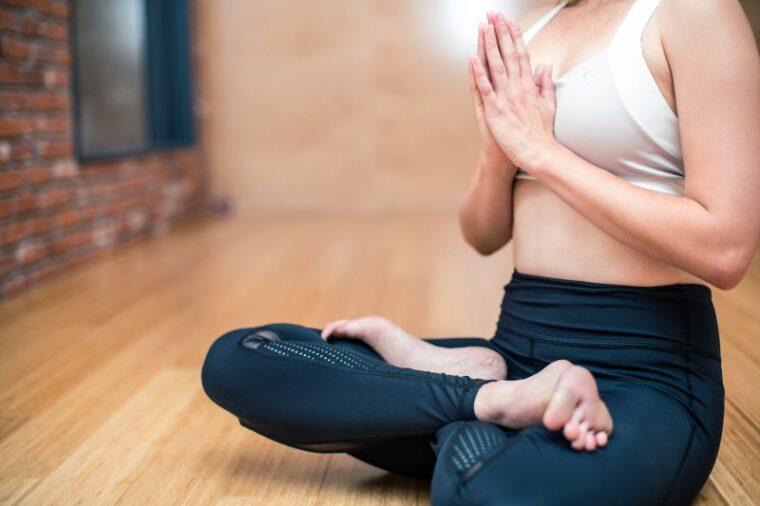
Anxiety arising from wandering thoughts, whether about future moments or from thoughts of the past, can have a detrimental effect on the body. Even if left unchecked, this anxiety can lead to mental fatigue that ultimately disrupts your health.
Techniques of Awareness Exercises
Individuals grappling with anxiety tend to get caught up in self-referential thoughts. This affects their thought patterns and actions.
Hence, it’s necessary to take proactive measures to reduce and even heal this anxiety through awareness exercise techniques. Let’s delve into the techniques below.
1. Setting Intentions
Setting intentions is fundamental in overcoming anxiety disturbances. Strong intentions will keep you consistent in practicing awareness exercises. Furthermore, they can diminish the negative emotions that contribute to anxiety.
You can start by affirming positive statements to yourself such as “I allow myself to rest today,” “I have done my best,” or “I will treat myself with kindness.”
Positive affirmations surprisingly have a beneficial influence on your life. Therefore, they are apt as awareness techniques to reduce anxiety.
See also : 11 Affordable DIY Home Decoration Ideas
2. Meditation
Meditation for anxiety reduction can be done in various ways. It starts with sitting calmly for a certain period to focus your mind on your breath and noticing whatever you hear, whether external sounds or other sensations.
By being mindful of what is happening and the sensations at that moment, your mind becomes easier to control, effectively alleviating anxiety.
3. Observing Anxiety When the Mind Wanders
Observing the anxiety that arises can be done during meditation. You simply observe the worries that surface and realize that they are unlikely to happen.
Additionally, you can visualize each anxiety as moving away from you and being swept away by the wind.
4. Focus on One Thing at a Time
Difficulty in focusing on one thing is undoubtedly a factor in the emergence of anxious feelings. Therefore, ensure you focus on one thing at a time.
When working, make it a habit to fully concentrate on the task at hand. This way, you can utilize your senses to be more focused, especially when the mind and feelings are chaotic.
5. Going for Walks
Being outdoors is the most effective way to combat anxiety. Taking walks around your neighborhood can serve as therapy to alleviate anxiety.
During this activity, you can observe the sounds around you, the sensation of the wind on your skin, and even the surrounding scents. Focusing on your surroundings will help reduce anxiety.
You can also engage in this activity barefoot. Try to listen to your body’s response and movements slowly for a few minutes.
6. Breathwork Exercises (Mindful Breathwork)
Breathwork exercises are effective in reducing arising anxiety. There are specific breathing patterns or techniques that you need to follow to effectively manage anxiety.
First, choose a comfortable position, whether standing or lying down. Then, focus on your gaze. Next, take a deep breath and feel the sensation of the airflow.
Moreover, you can practice the 4-7-8 breathing exercise: inhale for 4 seconds, hold your breath for 7 seconds, and exhale for 8 seconds.
See also : Practical Healthy Food Recipes for Busy Weekdays
7. Grounding Exercises
Grounding exercises are considered quite effective in overcoming anxiety. These exercises involving all five senses can help us remember and connect to our existence by experiencing better control.
When your mind cannot be conditioned, you can perform grounding exercises like walking barefoot on the ground, lying on the ground or grass, or immersing yourself in natural water or the sea.
8. Muscle Relaxation
The symptoms of anxiety can be alleviated by practicing muscle relaxation. This activity is done to reduce tension that can lead to anxiety.
During muscle relaxation, find a comfortable position, whether sitting or lying down. Then, scan your body from head to toe.
Once you have scanned your entire body, feel the sensations that arise. Focus on your body and notice whether you feel tense or relaxed.
If you feel uncomfortable and tense, you can move your body or shake the tense areas to release tension and feel the sensation of relaxed muscles.
9. Spend Time Without a Phone
In daily life, individuals often rely on electronic devices, one of which is a phone. This device can be a significant trigger for anxiety.
To overcome this, try spending time without using your phone and engage in any activities you enjoy. This activity can be used to restore your mind to its original state without anxiety.
This method is often used as a way to reduce anxiety because you are not focused on content that may affect your life.
10. Journaling
Journaling is considered a mindfulness exercise technique that can reduce anxiety. This method can be used as a way to redirect your thoughts or feelings by channeling negative emotions into journal writing.
Writing in a journal helps people to understand and deal with their feelings better. When you write down your thoughts and emotions, it can make you feel better and less stressed.
It’s like letting out a deep breath after holding it in for too long. As you keep writing regularly, you learn more about yourself and how to handle tough situations.
11. Doodling or Coloring
When anxiety arises, take a few minutes to doodle. This activity will help you flow with creative ideas and allow your mind to rest for a while.
You can start by collecting coloring books for this exercise. There’s no need to hesitate or feel embarrassed about investing in coloring books because you’ll reap the benefits in achieving your goals without staring at blank pages.
Every small step can help reduce the anxiety issues you’re facing. As long as you remain consistent with the awareness exercise techniques, try starting with 5 minutes a day for meditation or other mindfulness techniques to achieve peace of mind and overcome negative emotions.
